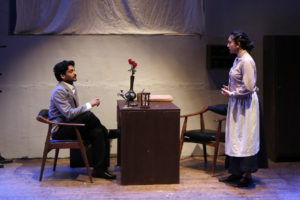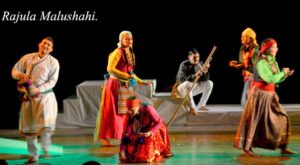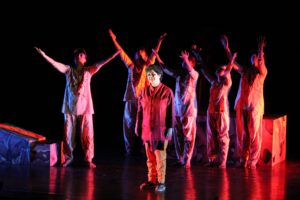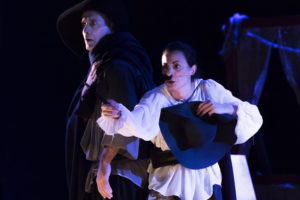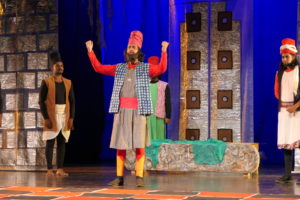Bipannata
The Play
Bipannata is the story of the helplessness of Sulagna Dutta, a woman in her late 50s, a widow and a single parent. She represents the middle class, who wakes up to a daily routine expecting a more or less secured lifestyle. She is neither a political bigwig nor a celebrity, but one of those you wouldn’t even notice when passing by. She has raised her son Ujaan to be a responsible man and who is now a computer engineer. The only problem is that he has his own well defined opinions. He is sensitive and reacts like a normal human being to events happening around him…events of large scale state generated violence that permeate into our lives and induce a constant state of fear. Sulagna is worried for her son, who goes into bouts of depression and hides at home, refusing to go out and participate in a world he cannot question. She sets up an appointment with a renowned psychoanalyst Dr. Ahana Roy.
What follows is a heartrending search into fear psychosis and the resulting helplessness. Are we all trying to hide in our cocoons? Are we afraid to question? How is an individual supposed to negotiate in these circumstances? Do we need help? And who can help?
Director’s note
Choice of Bipannata – a rationale: The play tries to address the feelings of fear and helplessness that we carry within us in these hard times. How is one supposed to react to the violence that one witnesses daily? To questions of state induced terrorism, rape, capital punishment…….? Is one expected merely to drink it in with his morning cup of coffee? Or can one exercise his basic right of speech and thought? Can one help himself? Is there someone who can help? Can he expect any help at all?
The Director
Sohini Sengupta is an upcoming director and a leading stage artist and trainer of Nandikar. She has acted as the lead in most of Nandikar’s recent productions and also in some of the plays sponsored by the British Council and other reputed theatre groups from Kolkata. Her character in Aparna Sen’s film Paromitar Ekdin brought her major acclaims, including the award for the Best Supporting Actress at National Film Awards, the highest Indian recognition given to film artists. She has also received the Sangeet Natak Akademi’s Ustad Bismillah Khan Yuva Puraskar for her contribution to theatre.
The Playwright
Debatosh Das (born 11th, January 1972) is a contemporary Bengali novelist and short story writer. He is a Post-Graduate in Comparative Literature from Jadavpur University. He has written- two novels, four plays and fifteen short stories so far. He also writes features on varied topics in different newspapers regularly. He appeared in Bengal theatre with his maiden play
O Chand in 2012, which deals with the Maoist movement in India. Bipannata is his second play. It was published in the theatre magazine ‘Bahurupi’ in 2013.
The Group
‘Nandikar’ is a 53-year-old institution which has been at the forefront of the national theatre movement since its birth in 1960, and is recognized for the diversity, quality and scale of its sustained activities. Nandikar has produced about 80 plays, performed nearly 8000 times across the nation, featuring in all major national and state festivals, as well as abroad. Many of its productions, e.g. Natyakarer Sandhane, Chhati Charitra, Tin Poysar Pala, Bhalomanush, Football, Antigone, etc., have had more than 400 performances. Beyond its theatre mould, with wide reach and professional quality, it has also carried out diverse socio-cultural activities in various segments over the years. It holds workshops and works with institutions and organizations like Ministry of Women and Child Development, Human Resource Development, Sangeet Natak Akademi, ICCR and NSD under different collaborations. Nandikar is also involved in research, documentation & dissemination of literary, audio and video formats; organizes national integration camps; and hosting international exchange programmes.
